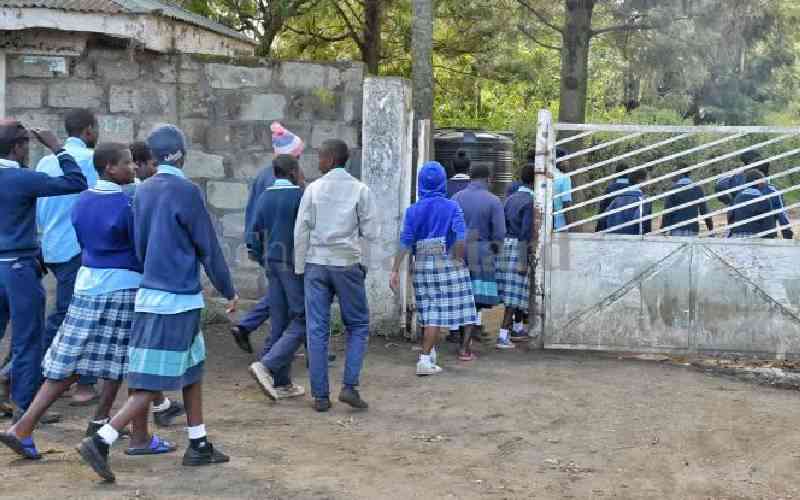By KIPKOECH TANUI
Just after the Gilgil Toll Station on the Naivasha–Nakuru Highway, there is a thicket beside the road where bus drivers stop to allow their long-distance passengers to dash for cover and relieve themselves. I don’t know how the silent agreement is reached over where the men and boys would go, and the side preserved for women and girls.
I said men and boys, women and girls, because I am not talking about city dwellers who unashamedly announce to their spouses, in the presence of children, that they are stepping out to be with the girls or the boys, depending on their sexes.
Yes, so what happens after the bus stops — and don’t ask where I saw this because I am not saying this with pride — ni kama vindeo, ni kama ndrama (unbelievable stuff). I have noticed the older you are, the nearer to the bus you will do your thing and your sex may not matter much, but the silent rule seems to be that you must face away from the crowd that chose to remain in the bus.
It is also obvious that if it is a more elaborate exercise requiring squatting and other physical movements, you have no choice, but to venture further for privacy.
But for a child, who cares, they are allowed to start the mechanics of evacuating the bowel and or bladder just a metre away from the ride. We shall come back to that later, but I will assure you that once back, the now-relieved (pun intended!) passengers will plunge into their seats and get out that boiled maize, mandazi or cake they bought on the way to the stage. And mark you, they won’t have washed the hands.
You must be wondering why this wretched story. But I will come to that. Before doing so, let me tell you this is no exaggeration. It happens everywhere on our roads and many places. That is why on the concrete walls in towns, you will see the reprimand: Usikojoe Hapa (don’t urinate here) and some idiot (always men) will just turn the back on you and start doing exactly that. You would think their biological switches were turned on by the warnings.
To understand where we are headed, let me remind you that shameful, civil and primitive as this is, it is a manifestation of our misplaced priorities and the collective failure of leadership in our society. I refuse to accept it is a consequence of poverty unless it is that strand layered with ignorance.
Let us turn this discourse the other way round; why didn’t the Ministry of Transport or county governments put up, or even encourage private investors to set up clean public toilets at ‘comfortable’ intervals on the highways? The national government has after all, made petrol expensive by taking Sh40 from each of the millions of litres sold out in Kenya every day.
Who is not embarrassed when they see grown ups, children, mothers, fathers, girls and boys in the bush, in all styles, emptying their bladders and bowels? And on the flipside, why don’t the bus operators lobby for this little comfort we take for granted? You only need to run a roadside food business like the Delamere Shop in Naivasha, to understand why they sell a little piece of toilet paper for Sh10.
What it means is, you will have tens of buses stopping per day, and only a handful will buy your stuff, but the rest will queue in the toilets and head straight to the bus, leaving you to meet the cost of toilet paper and water flushed down the drain. Joined by uncouth fellows on small cars, who usually leave the “small rooms” in a terrible state. In all, you are the one to do the cleaning.
You can now understand why petrol stations are not keen to have open toilets, they actually keep the keys and if they give it to you, you will find that the holder is the size of a shoe sole, so that you won’t forget to return it. It is just a Kenyan way of deterring the would-be thief. Now, let us forget about the toilets and switch to what actually goes on inside the buses and matatus, which usually look neat outside, but get in and banana and orange peelings, grains of maize and groundnuts casks as well as cigarette butts and pamper wrappings all strewn on the floor will give you the feeling you are in a mobile slum, complete with some form of flying toilets.
Don’t even venture into what we keep throwing out of our vehicles, including spit and mucus. Agreed, the luxury buses are loaded with DVD and TV gadgets, but guess what; they overcharge you for that and because of our love for big money in exchange for poor service, the operators who have installed toilets inside their buses will shamelessly charge as much as the guy who used a plane to your destination.
Now, close your eyes and picture the matatu or bus stages you have been to. Do you see the dirt, the bhang-rolling pick-pockets and the thieving fake preacher? Are you seeing guys being literally pulled by touts into the buses that you think are almost full kumbe half the guys inside are just decoys who will alight the moment more passengers come in?
What is the point we are making? Simple, our public transport is dirty, primitive and dehumanising. It is also immoral, that is why there is so much crime, you could actually be robbed or groped! Then out there, it is a major artery for corruption to the police and licensing chaps. It is also a sector largely run by more crooks than angels than any other.
Stay informed. Subscribe to our newsletter
Even if I spoiled your nyama choma appetite this Friday, let us agree that there is more we need to do, which do not cost money, to make public transport comfortable. Before we do that, we remain a bunch of jokers who seem keen not to apply what they learnt in school at home.
The writer is Group Managing Editor (Print) at The Standard.
[email protected]
 The Standard Group Plc is a
multi-media organization with investments in media platforms spanning newspaper
print operations, television, radio broadcasting, digital and online services. The
Standard Group is recognized as a leading multi-media house in Kenya with a key
influence in matters of national and international interest.
The Standard Group Plc is a
multi-media organization with investments in media platforms spanning newspaper
print operations, television, radio broadcasting, digital and online services. The
Standard Group is recognized as a leading multi-media house in Kenya with a key
influence in matters of national and international interest.
 The Standard Group Plc is a
multi-media organization with investments in media platforms spanning newspaper
print operations, television, radio broadcasting, digital and online services. The
Standard Group is recognized as a leading multi-media house in Kenya with a key
influence in matters of national and international interest.
The Standard Group Plc is a
multi-media organization with investments in media platforms spanning newspaper
print operations, television, radio broadcasting, digital and online services. The
Standard Group is recognized as a leading multi-media house in Kenya with a key
influence in matters of national and international interest.







